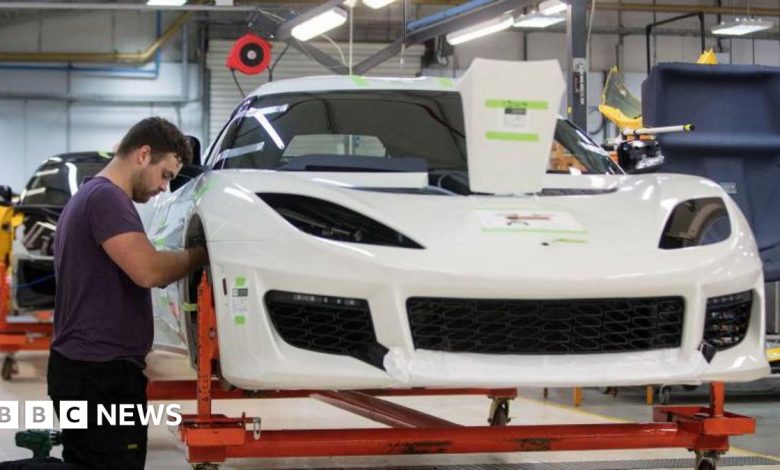Lotus considering shifting UK production to US, BBC understands

The American market has long been a vital lifeline for Lotus, the renowned British car manufacturer. However, the company’s business has been threatened by the hefty tariffs imposed by the US government. As of now, US sellers are forced to pay a whopping 25% tax on imports of cars and car parts, which has significantly hindered Lotus’s ability to compete in the American market. The company’s predicament is not unique, as recent figures have revealed that exports to the US from the UK’s car industry have halved due to President Donald Trump’s tariffs. This dramatic decline has prompted some car makers to halt shipments altogether, in a bid to avoid the crippling taxes. For Lotus, the situation is particularly dire, as the US market accounts for a substantial portion of its sales.
The UK government, in an effort to mitigate the damage, has negotiated a deal with the Trump administration to lower tariffs on UK-made cars entering the US to 10%. While this agreement is a welcome respite, it is not set to come into force until the end of June, leaving manufacturers like Lotus to navigate the treacherous waters of higher tariffs for the time being. The company, majority-owned by the Chinese conglomerate Geely, has been reorganizing its diverse portfolio of car brands, which includes Volvo, Polestar, and Lynk and Co. Lotus currently operates manufacturing facilities in Norfolk, England, and Wuhan, China, but the uncertainty surrounding tariffs has cast a shadow over its operations. Founded in the early 1950s by the visionary engineer Colin Chapman, Lotus has a rich history and a loyal following, but the challenges posed by tariffs have forced the company to make tough decisions.
In April, Lotus announced that 270 jobs would be cut, citing “volatile and evolving market conditions” and the impact of US tariffs. This move followed previous job losses last year, but the company has stressed its commitment to the UK and emphasized that the restructuring is essential to enhance its competitiveness. The decision to downsize was undoubtedly difficult, but Lotus is determined to adapt and survive in an increasingly hostile trade environment. President Trump’s tariffs have been a major factor in the company’s struggles, as the US market is crucial to its success. The higher taxes on car shipments to the US have made it harder for Lotus to compete with American-made goods, which has resulted in a significant decline in sales. The company is not alone in its struggles, as the UK’s car industry as a whole has suffered from the tariffs, with exports to the US plummeting by 50%.
The UK government’s deal with the US to lower tariffs is a positive development, but it is a temporary solution that only applies to 100,000 British cars being imported to the US per year. This quota matches the number of vehicles the UK exported to the US last year, but it is a limited reprieve that does not address the broader issues surrounding trade tensions. If a deal had not been reached, UK exports would have been taxed at 27.5%, a rate that would have been catastrophic for the car industry. The lower tariff of 10% is a welcome reduction, but it is still a significant burden that Lotus and other manufacturers will have to bear. As the company navigates this complex landscape, it is clear that the road ahead will be challenging, but Lotus remains committed to its core values of innovation, performance, and quality.
The human impact of the tariffs should not be underestimated, as the job losses announced by Lotus are a stark reminder of the real-world consequences of trade policies. The company’s employees, many of whom have dedicated their careers to the brand, have been affected by the restructuring, and the uncertainty surrounding the future of the business has created anxiety and concern. The local community in Norfolk, where Lotus is based, has also been impacted, as the company is a significant employer and a source of pride for the region. The tariffs have not only affected Lotus but have also had a ripple effect on the entire supply chain, from component manufacturers to dealerships. The situation is a complex web of cause and effect, where the consequences of trade policies are felt far beyond the boardrooms and factories.
In conclusion, the tariffs imposed by the US government have presented a significant challenge to Lotus, a company with a rich history and a loyal following. The lower tariff rate agreed by the UK government and the US is a welcome development, but it is a limited solution that does not address the broader issues surrounding trade tensions. As Lotus navigates this complex landscape, it is clear that the road ahead will be challenging, but the company remains committed to its core values of innovation, performance, and quality. The human impact of the tariffs should not be underestimated, and it is essential to consider the real-world consequences of trade policies on companies like Lotus and their employees. As the global trade environment continues to evolve, it is crucial to find solutions that promote fair trade, innovation, and economic growth, rather than resorting to protectionist measures that harm businesses and communities.









I’m not that much of a online reader to be honest but your blogs really nice, keep it up! I’ll go ahead and bookmark your website to come back later. All the best
My brother suggested I may like this blog. He was totally right. This put up truly made my day. You can not consider simply how much time I had spent for this info! Thanks!
Hey very nice site!! Man .. Excellent .. Amazing .. I’ll bookmark your web site and take the feeds also…I’m happy to find numerous useful info here in the post, we need develop more strategies in this regard, thanks for sharing. . . . . .
Howdy! I know this is kinda off topic nevertheless I’d figured I’d ask. Would you be interested in exchanging links or maybe guest authoring a blog post or vice-versa? My blog goes over a lot of the same subjects as yours and I think we could greatly benefit from each other. If you’re interested feel free to shoot me an email. I look forward to hearing from you! Wonderful blog by the way!
Really Appreciate this article, can I set it up so I receive an update sent in an email when you publish a fresh post?
Yay google is my queen assisted me to find this outstanding website ! .
I’m so happy to read this. This is the type of manual that needs to be given and not the random misinformation that’s at the other blogs. Appreciate your sharing this greatest doc.
Super-Duper website! I am loving it!! Will be back later to read some more. I am bookmarking your feeds also
WONDERFUL Post.thanks for share..extra wait .. …
Perfectly pent subject material, Really enjoyed reading through.